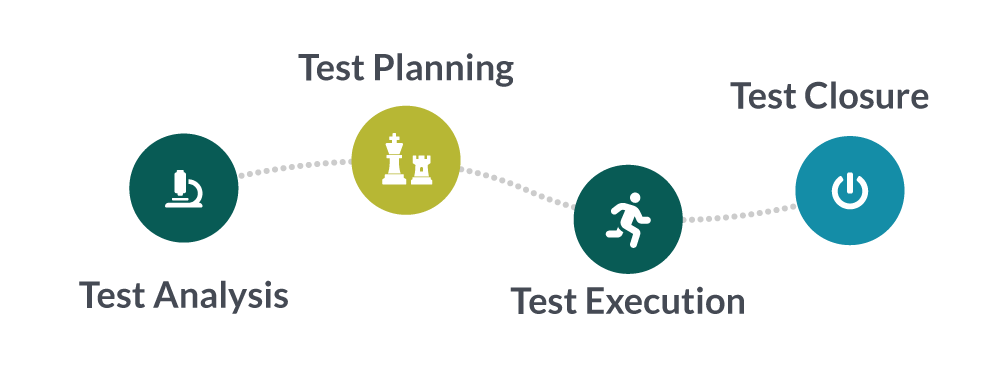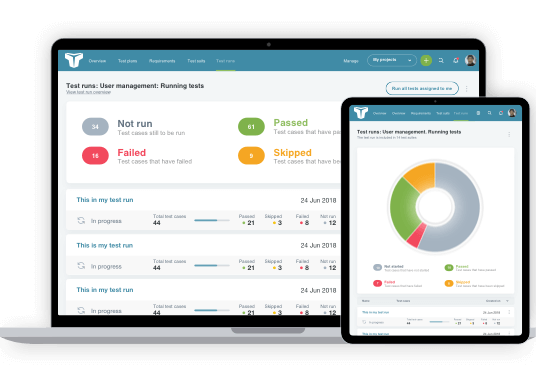Teams produce the best possible products using limited resources only when there are well-planned and well-managed testing processes in place. But what is test management and how can it help the process? Test management is important to the success of the software testing life cycle within an organization and here, we tell you more about the processes, the role its and responsibilities.

Why do we need test management?
The purpose of test management is to help meet customer demands as efficiently and as economically as possible by making best use of all assets in a timely manner. Ever increasing competition and complexity bring extra pressure for organizations to develop a product in the shortest time possible and without any glitches. Test teams collaborate with the development team to produce software within tight deadlines, with much emphasis being placed on test management.
In test management, the test manager has the primary role in overseeing all activities, and being leader of the team, must ensure that all processes are properly followed. In order to deliver a quality product, test management has clearly defined roles and responsibilities, which subsequently help the development of the project at a steady pace with the confidence that few defects remain.
Test Management Processes
There are four phases in test management:
- Test Analysis: In this phase, the functional and non-functional requirements of the project are analyzed.
- Test Planning and Preparation: In this phase, the testing environment is set up along with everything needed for the preparation of test planning, test data, and test cases.
- Test Execution: This is the phase where actual testing begins and defects identified and reported.
- Test Closure: In this last phase, test reports are written that record all test activities and results, which will help to make further improvements in the future.
To learn more about these four processes, see our test management processes post.

Test Management Challenges
Test managers have the responsibility of delivering projects on time and within budget, and they need to stay aware of progress so they can intervene and make timely decisions, if any risks appear. When deciding whether or not to release the system, the test manager can offer considerable assistance to the client by showing the risk factors and insight into the quality of the system. Besides project management, test management has its own approaches and responsibilities in which test managers set their own planning and budget.
Managing the Test Team
Effective management of test team helps an organization to keep their focus and aligned with the schedule throughout the entire life-cycle of the project. It is recommended to utilize the test management tools available in the market such as TestLodge, which offers a collaborative work environment and reporting functions. Usually, these tools help in allocating the tests, executing the test and manage teams anywhere, which ultimately increase the productivity and assist the test manager to produce more in a short span of time.
Related Test Management Tasks / Activities
- Preparation of test cases: Test cases help us determine if the feature of the application is working as expected.
- Organizing the test cases: Organization of test cases should be in such a way that whole feature can be tested.
- Execution of test cases: Actual test data can be executed and defects are reported back to the development team.
- Monitoring the test execution: To improve the process and flow of execution, monitoring is done to remove any roadblocks.
- Reporting & Analysis: All the useful information of the life cycle are gathered and compiled. Analysis help teams to work on improvements.
- Leading the team: Leadership is an important factor without which no team can achieve their goals.
- Internal and external relationship management: Communication with all the stakeholders is the key in the management without which end-goals are hard to be achieved.
- Assets management: All the documents and artifacts should be managed in an organized manner.
Factors that can Negatively affect Test Management
Inadequate Testing Time: Though enough time is allocated for the development activities to attain the highest quality possible, carefully planned projects can have implications when it comes to testing where time is compromised. Subsequently, the results are not reliable and quality is hampered.
Lack of resources: To allocate the right resource with the right expertise and in the right place is a challenging task. The effect of not arranging the right pool of resources is the same as not having enough time to carry out the testing activities.
Distributed Teams: In today’s globalization, organizations outsource their testing efforts to the teams located in different geographical locations with the aim of reducing the cost. There are certain challenges which must be taken into consideration and keep in view how the teams can share knowledge and communicate with each other to avoid any delays which can potentially be disastrous for the project’s outcomes.
Clear Requirements: In order to validate business and technical requirements, there must be present clear and precise testable requirements of the project. The repercussions of not having complete requirements can be disastrous which can cost the organization time and money. To avoid any such problems, test management tools can aid in testing efforts by creating requirements in an organized manner.
Importance of Test Management Tools
As discussed, there are many things involve in the test management, from analyzing the requirements and writing test cases, to collect the result and share with all the stakeholders. If minutest of the things got missed, it may have a huge impact and project delivery can be delayed. In order to orchestrate all the things, test management tools help us to avoid any pitfall.
Test management tools, such as TestLodge provide flexibility and ease of use. They help testers identify critical bugs which is the primary feature of the tools. Also, the integration of tools with the existing testing platform is also easy which helps in automating the entire management process. Reporting is another feature which teams can use to analyze their progress with analytics and comprehensive reports. All these and other features provide flexibility to the team and enhance their abilities. You might want to explore the most popular free test management tools available before choosing one with the features that you really need.
About the writer
Syed Ali Imam
Syed Ali Imam is a Software Quality Assurance Engineer, currently working as a Functional Tester for Innovit Software Development in Australia.
All Syed Ali Imam's articles
